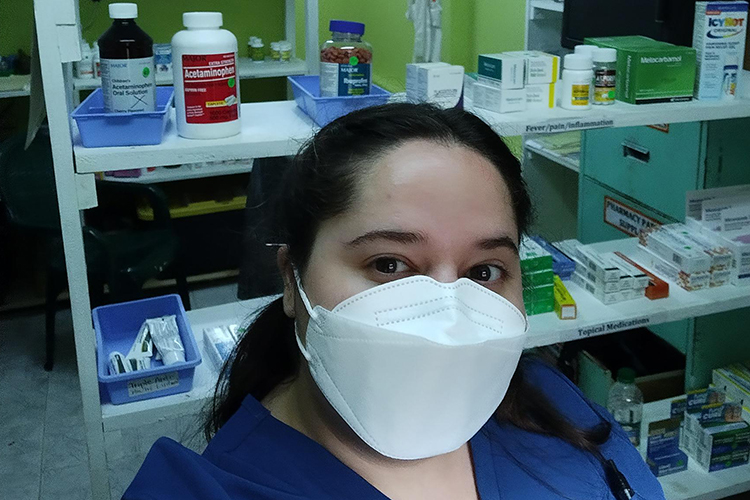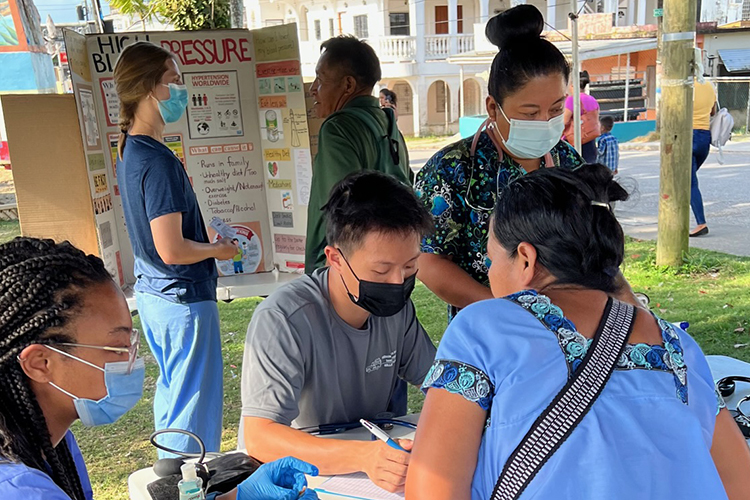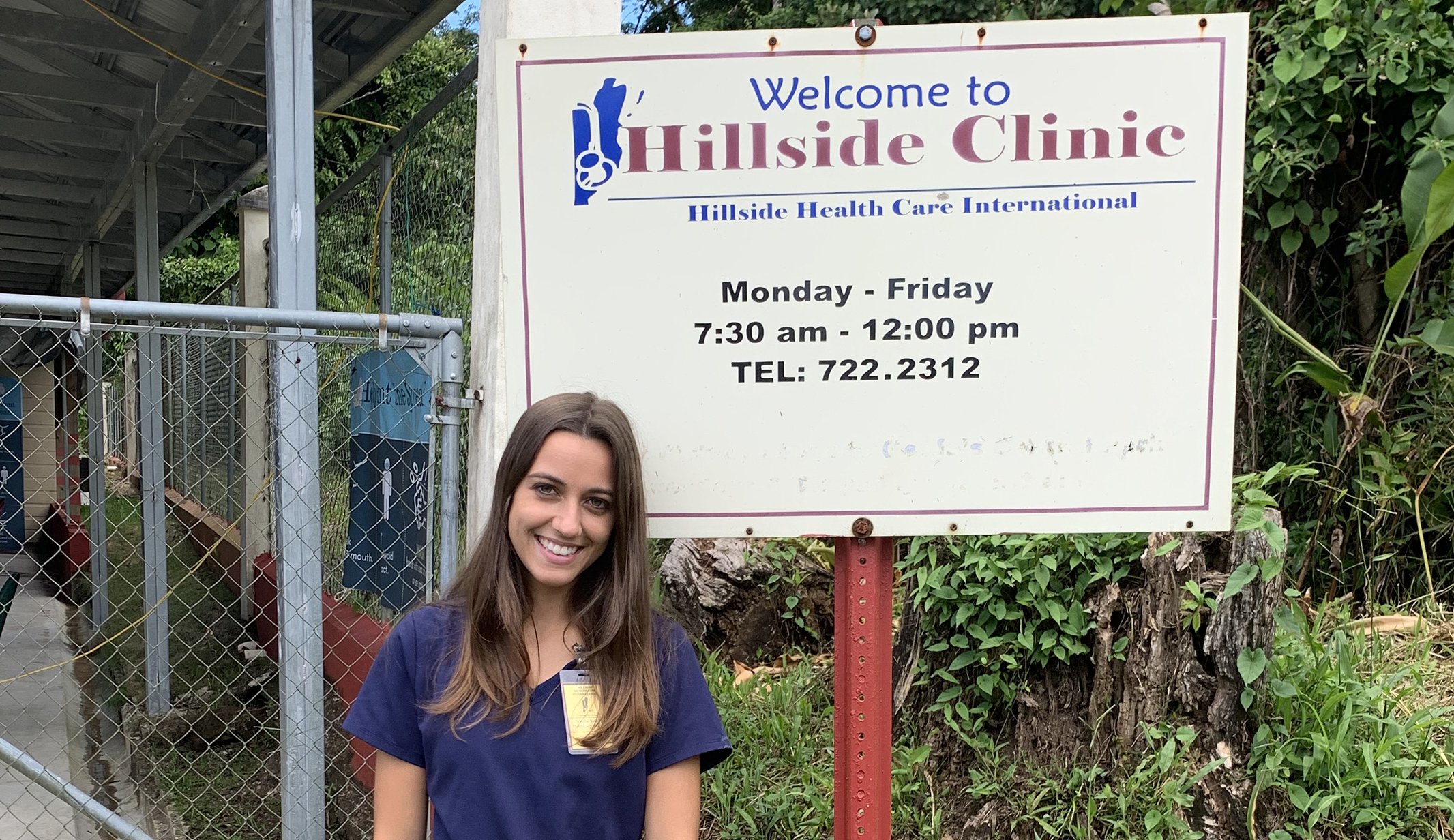Today’s pharmacists fill a multitude of roles as health care providers, but even this was a new one for UMKC pharmacy student Natalie Bishop.
Bishop is one of three UMKC pharmacy students who spent a month doing a clinical rotation at Hillside Health Care International, a small nonprofit clinic in Eldridgeville, Belize, a tiny community just miles from the port city of Punta Gorda.
During her stint at Hillside, a young boy suffering from acute asthma came to the clinic for a refill on his inhaler. Bishop and the clinic pharmacist explained to the patient how using a spacer, a short plastic tube attached the inhaler, would help deliver the medication to his lungs more effectively and help him better manage his asthma.
Seemingly simple resources, such as a spacer for an inhaler, can be a luxury in this part of the world. The clinic pharmacist and Bishop did the next best thing, cutting up a plastic bottle and strategically applying some duct tape to craft a needed spacer for their patient to use with his inhaler.

“They don’t have all the resources down there like we do here, so to be able to think on your feet and use what you do have is important,” Bishop said. “It was so cool seeing the pharmacist make one right there and help the patient moving forward.”
After Bishop, a pharmacy student on the Columbia, Missouri campus, returned home after completing her rotation, Lily Edwards, a student at UMKC’s campus in Springfield, Missouri, took her place in Belize. The two shared similar experiences. The clinic in Eldridgeville is largely made up of volunteers who support a small handful of physicians and one full-time pharmacist. That meant when Bishop and Edwards weren’t working side by side with the staff pharmacist, they found themselves working on their own.
“It really pushed me a lot to know things because resources are limited there,” Edwards said. “I didn’t get to look everything up before I had to answer a question. I really had to know my stuff and be ready to recall it.”
“It really pushed me a lot to know things because resources are limited there.” - Lily Edwards said.
Carlos Olivas, a student on the Kansas City campus, completed the same rotation in January. While Bishop, Edwards and Olivas served the same role at the clinic, collaborating with doctors, medical students and physician assistant students while dispensing medications and counseling patients, Olivas said their situations were different.
“I was actually fortunate enough to have two other pharmacy students there with me,” Olivas said. “We were able to kind of team up together where Natalie and Lily didn’t have other pharmacy students with them to help.”
That came into play on mobile clinic days.
Each week, doctors and students would load a van with essential medications and travel from 45 minutes to three-hours from their home clinic to remote regions and villages where they would see as many as 40 to 50 patients in a day. One long trip took Edwards and her team to a village that had not received medical care for three years.
Operating out of a building with no electricity or running water, Edwards was the lone pharmacist on the team, dispensing medications and counseling patients. Before the day was over, the team had run out of antibiotics before running out of patients. Edwards was forced into problem solving mode.
“Doctors are coming to me saying, ‘I want this antibiotic for an ear infection,’ and I’m telling them, ‘I’m sorry, what’s your next choice? I have this,’” said Edwards, who looked back on the experience as both stressful and extremely rewarding. “It was incredibly eye opening. It definitely pushed me further than I thought was possible.”
Problem solving became part of the regular routine for the student pharmacists as they were often dealing with limited supplies, answering questions about available medications and determining proper dosings.
"I definitely developed a lot of communication skills throughout the time I was there.” - Carlos Olivas
“That was really a neat experience getting to collaborate with (physician assistant and medical students) and show them what a pharmacist can do, the knowledge that we have,” Bishop said. “It was fun to work with them because they didn’t realize what we learn. We don’t diagnose patients, but we have to learn about the diagnosis so that we can recommend the right medications.”

Those collaborations made for a rewarding experience that Olivas said he wasn’t expecting.
“The discussions were very open,” he said. “They would come to us whenever they needed any kind of expertise in our realm of ‘what is the dosing’ or ‘what do we have?’ Being able to have those open discussions was great and I definitely developed a lot of communication skills throughout the time I was there.”
Not all of their time was spent in the Eldridgeville clinic or the mobile clinics. The three also found themselves enjoying time in another public health service role, visiting local schools and participating in public health fairs, doing everything from blood-pressure checks to diabetes screenings.
Olivas spoke to a group of school children about the need for and benefits of good nutrition and exercise. While interacting with a particular classroom of 30 to 40 third- and fourth-grade students, all smiling and laughing with him, the students at one point began telling him what they knew about carbohydrates and cholesterol.
“I was like, you’re in third or fourth grade and you’re talking to me about that,” Olivas said. “It was really cool.”

